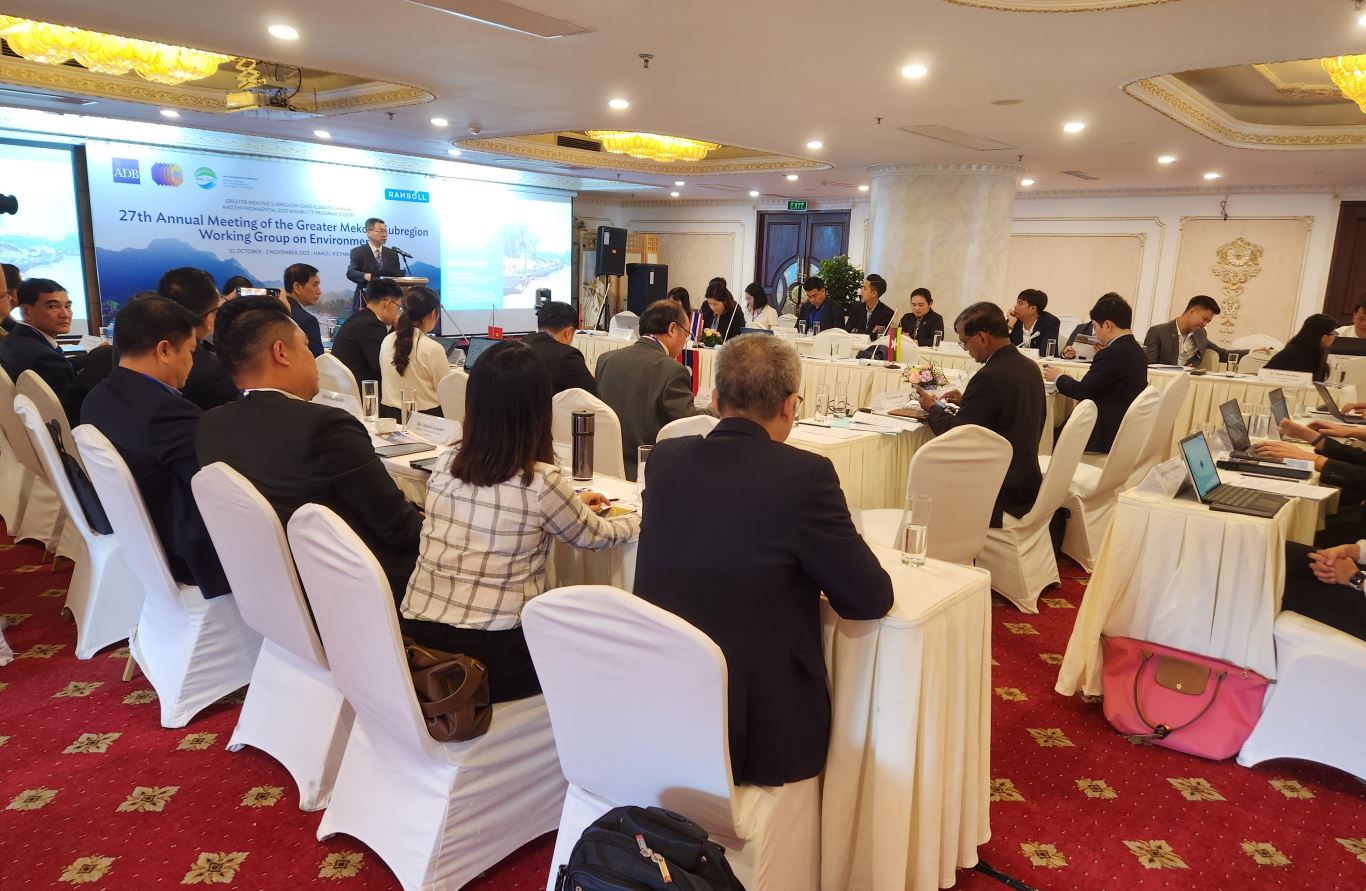

02/11/2023
From 31/10/2023 to 2/11/2023, the 27th Annual Meeting of the Greater Mekong Subregion (GMS) Working Group on Environment will be held in Hanoi.

The 27th Annual Meeting of the GMS Working Group on Environment in Hanoi on 31/10/2023
Speaking at the opening of the Meeting, Ass.Prof.Dr. Nguyen Dinh Tho, Director General, Institute of Strategy and Policy on Natural Resources and Environment (Ministry of Natural Resources and Environment) shared that, GMS countries in general and Viet Nam in particular have grown rapidly in the last decade that made significant social-economic achievements. However, it brings about a number of challenges that no one would have opposed, including environmental degradation, loss of environmental services and reduced ecosystem connectivity. Furthermore, the benefits of economic growth have not sufficiently trickled down to the poor. The rural poor, particularly ethnic and upland communities are often highly dependent for their livelihoods on the local environment, have faced declining natural stocks and ongoing insecurity over land tenure and resource access rights. The inadequate governance systems have threatened ecosystem productivity, return on economic investments in key sectors, and the long-term sustainable development of the subregion. The impacts of climate change are also broadly common to all the countries in the subregion.
The 27th Annual Meeting of the GMS Working Group on Environment (WGE AM-27) will specifically focus on themes 2 and 5 of the GMS Climate Change and Environmental Sustainability Program (CCESP) has successfully achieved given objectives: To share national priorities, strategies, and road maps of the GMS countries for deploying new innovative and digital technological solutions and facilitating low carbon transitions in the green freight and agricultural sectors; To discuss and to agree upon priority actions for regional cooperation under the CCESP to enhance the use of digital technologies and facilitating low carbon transitions in the transport and agricultural sectors in the GMS.
During the Meeting, there will be 11 sessions and 40 presentations with the main point of climate technologies, and low carbon transitions in the transport and agricultural sectors have been taken place that have been obtained a lot of useful feedbacks from participants. The active participation of distinguished participants has created an open talk for exchanging ideas that has contributed to achieving the Meeting’s objectives. Main points emphasized in Meeting sessions include:
Firstly, the Meeting has concentrated on the findings of the Green Technology Needs Assessment (GTNA). During the Meeting, we have exchanged details on national priorities and strategies on technology deployment for climate action and environmental sustainability. Blockchain-enabled climate action monitoring and Artificial Intelligence-enabled pollution monitoring have been also focused on. Moreover, the Meeting has provided the platform to share knowledge of drone-enabled sustainable forest management. Through this Meeting, it can be seen that mobile phone-based early warning systems - adaptation would bring benefits in the fields of precision agriculture, urban planning, disaster management, etc.
Secondly, it has been introduced in the Meeting the Green Freight Policy Needs Assessment. Simultaneously, we have talked about first mile transportation for regional freight movements and cross-border collaboration and last-mile transportation for accelerating towards green urban freight. For low-carbon transitions, low carbon agriculture policy needs assessment has been introduced to participants. It has been identified the agricultural innovation, communication, and outreach on Low Carbon Agriculture. The Meeting’s focus also has been on financial products and carbon markets for Low Carbon Agriculture. We have discussed priority actions for regional cooperation under the CCESP to enhance the use of digital technologies and innovative climate financing in the GMS.
Thirdly, the GMS Knowledge Network and Work Plan has been introduced virtually in the Meeting. The GMS Knowledge Network (GMSKN) has been expected to provide expertise, stimulate discussion, and raise awareness on relevant and emerging issues in the GMS. GMS initiatives have achieved significant success in the areas of cooperation among nations through investment projects on transport infrastructure, electricity, tourism, agricultural development, environmental protection and human resource development. The collaboration between WGE and Knowledge Network has been expected to reinforce regional connectivity and integration toward achieving the GMS member countries’ shared vision of an integrated, prosperous, sustainable, and inclusive GMS.
Hương Trần